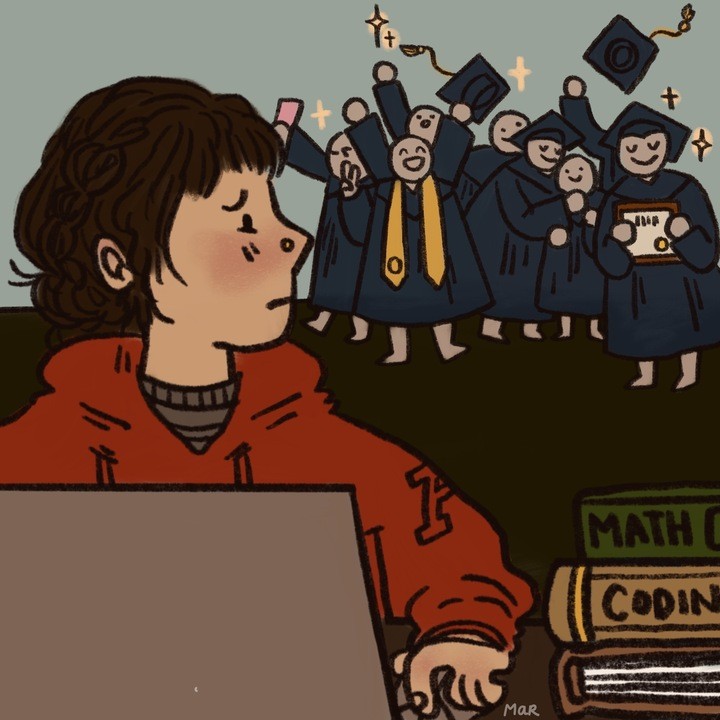The race to beat time and your peers at 6 a.m. the morning of registration day is stress-inducing. You may wake up on time and refresh the page immediately at 6 o’clock, but that does not always guarantee you a spot. If you can’t enroll in the classes you need, you are at risk to graduate past the four year mark. However, as I wrap up my sophomore year, I find myself questioning if graduating later is such a risk after all.
Money aside, what is the rush to graduate in four years?
Kristen Saban, a senior graduating in December, said, “All my friends from here at the university and my hometown are graduating. I see people taking their grad pictures and moving on with their lives, and I’m not doing that. I feel like, since everyone is moving on, I should be too.”
Saban expressed that she is lucky enough to attend UA on a scholarship guaranteed for eight semesters. Without the funding or the flexibility of taking online classes, however, she said there would be a lot more pressure to graduate in four years.
Nevertheless, Saban recognizes the pros of taking an extra semester to graduate. She plans to “hold onto school resources such as the Writing Center, Microsoft Office and Adobe” in the process of applying to graduate school. At the same time, the eight month break between graduation and the start of grad school will allow her to take up internships and feel more prepared for the next chapter.
Being a university student is a constant reminder of the Western practice of rushing. We are taught to work and take classes during breaks, rather than rest our minds and bodies. We are taught that entering college as an undeclared major is to be confused. We are taught that taking a gap year or graduating late causes us to fall behind. But there is not one singular standard that defines the meaning of “falling behind.” Everyone learns at their own pace, so taking breaks and slowing down the process are respectable choices.
Sophomore McKenna Manzo expresses the expectation to graduate in four years as “unrealistic.” She stated: “There is no ‘on time.’ More than your capability, it’s more so a matter of how you want to look at school. Everybody looks at school differently and everybody learns at a different pace than others, and I think you just have to keep in mind that just because you see somebody else on a completely different path than your own, it doesn’t mean you have to match your pace with somebody else’s pace.”
It may not be obvious, but while students are constantly being told to “catch up” and “get ahead,” they are being instilled with a competitive drive to beat their peers.
Even as an underclassman, Manzo, like Saban, feels that this stress is induced by comparison to peers. “A lot of it comes from seeing the people around you: seeing how successful they are or how many internships they have and seeing how set up they are for after college only as sophomores. Seeing them grow faster than you makes you feel like you have to be up to their same speed when, in reality, everyone’s path is different […] that doesn’t make you any less than the person you’re comparing yourself to,” Manzo said.
Proponents of four-year college plans often make the argument that each semester should exceed the credit requirement; it is said that students should also choose a major early on and stick with it. What about the students who are overwhelmed with course loads of more than 12 units? Taking anything more may cause them to get lower grades, which is ultimately more harmful than graduating in more than four years.
What about the students who have many interests and become unhappy with the major they chose at the onset? Should they be expected to continue with an unfulfilling career path or sacrifice a little more time to complete a degree they are proud of? Young people should not have to maintain a singular focus in college. This is an unreasonable expectation. From the age of 18 to the age of 21 — practically from children to adults — we are evolving and establishing our identities to be accepted into the world. Part of that development is found in the exploration of careers and interests. If the opportunity to try a variety of options is denied, students who are seeking an education without one major in mind are unjustly neglected.
The A Center at the university is an active advocate of taking time to choose a major. UA does not require students to declare a major until they are in junior standing and, in the meantime, The A Center is where help is provided. Undeclared majors can seek assistance from The A Center advisors in exploring majors and finding internships.
UA has a four-year graduation rate of only about 50%, making it even more curious that four years remains the nationwide standard. Some argue that numbers shouldn’t be a measure of success. In that case, a refreshing model that expects “lifelong in-and-out, come-and-go education” is encouraged. Although not everybody is in and out of school their whole lives, it makes sense to set a standard for continuous growth.
Going forward, I think I’ll keep in mind the importance of an ongoing education. No matter whether I graduate before, after or right at four years, my experience is not any less valuable than those around me. I’ll be maintaining my health better with less anxiety about fulfilling this unreasonable expectation to suffocate the college years with all work and no rest. I encourage you to ease yourself of that fear as well and to realize that you can take your time.
Follow the Daily Wildcat on Twitter

Noor Haghighi is a second-year student exploring ways to harness her passions in environmental science and journalism. She loves wildlife photography and portraiture, fashion, music and film.









